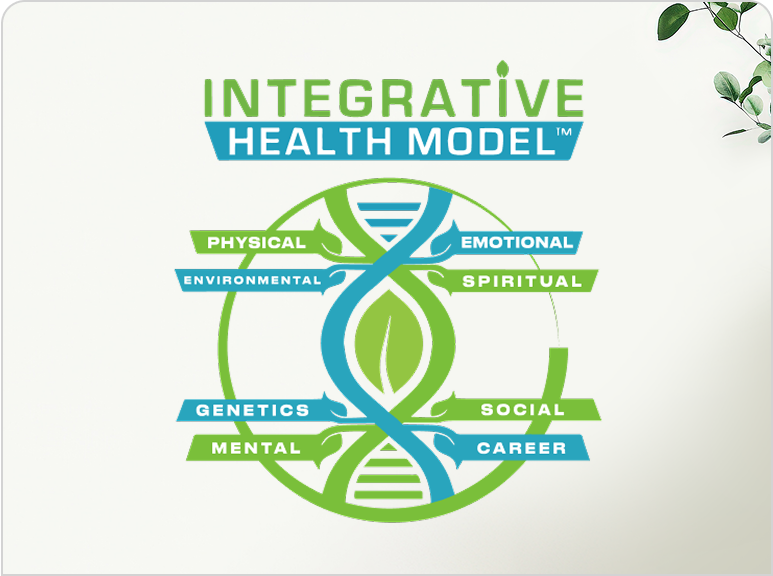How Do I Know If I Have Gut Feeling or Health Anxiety?

To know if you're experiencing a gut feeling or health anxiety, focus on the quality of the sensation. Gut feelings are calm, specific, and intuitive like an inner knowing about something in the moment. Health anxiety feels overwhelming, scattered, and fear-driven, often causing physical symptoms like a racing heart or nausea. If your thoughts fixate on worst-case health scenarios and last for hours or days, it's likely anxiety. If the feeling is quick, clear, and passes once a decision is made, it's more likely your gut talking.
What Are Gut Feelings?
Gut feelings are your body's way of giving you quick information about a situation. Think of them as your inner wisdom speaking up. When you have a gut feeling, it's like your brain is processing lots of information very fast and sending you a signal through your body.
Your gut feelings often come from your subconscious mind picking up on details that your conscious mind might miss. Maybe you meet someone new and instantly feel comfortable with them, or you walk into a room and something feels "off" even though you can't explain why. These are examples of your gut giving you valuable information about your environment.
How Gut Feelings Work
Your gut actually has its own nervous system called the enteric nervous system (ENS). Scientists call it your "second brain" because it has over 100 million nerve cells. This second brain talks to your main brain all the time, sharing information about what's happening around you.
The enteric nervous system works independently from your main brain but also communicates with it constantly. When you have a gut feeling, this communication system is sending you important information based on patterns it recognizes from your past experiences and current observations.
Common Signs of Gut Feelings
Gut feelings usually come on suddenly but feel calm. They give you a clear sense of "yes" or "no" about something. Unlike anxiety, gut feelings focus on what's happening right now rather than worrying about the future.
These feelings feel certain and confident, even when you can't explain why. They don't cause physical symptoms like racing heart or sweating. Instead, they point you toward a specific decision or action with a sense of inner knowing.
What Is Health Anxiety?
Health anxiety is when you worry too much about your health or think you might have a serious illness. It's different from normal concern about your body. With health anxiety, the worry takes over your thoughts and affects your daily life.
People with health anxiety often interpret normal body sensations as signs of serious illness. A headache becomes a brain tumor, chest tightness becomes a heart attack, or a mole becomes skin cancer. These thoughts can become so overwhelming that they interfere with work, relationships, and enjoyment of life.
How Health Anxiety Develops
Health anxiety often starts when you notice a normal body sensation - like your heart beating faster after climbing stairs. Instead of recognizing this as normal, your mind starts worrying that something is seriously wrong. This worry creates more physical symptoms, which then makes you worry even more.
The cycle can be triggered by many things. Maybe you heard about someone getting sick, saw a scary health story on the news, or experienced a stressful life event. Once the cycle starts, it can be hard to stop without the right tools and support.
Research shows that anxiety affects about 18% of adults, with women being more likely to experience it than men. Health anxiety is one of the most common types of anxiety people face.
Common Signs of Health Anxiety
Health anxiety feels completely different from gut feelings. It feels frantic and urgent, like something terrible is about to happen. You might worry about many different health problems at once, and your focus stays on what might happen in the future rather than what's actually happening now.
Health anxiety also causes real physical symptoms. Your heart might race, you might sweat or feel nauseous, and you could experience muscle tension. The worry feels overwhelming and hard to control, making you doubt yourself and seek reassurance from others repeatedly.
The Gut-Brain Connection Explained
Your gut and brain are connected through what scientists call the gut-brain axis. This connection helps explain why you might feel "butterflies" in your stomach when you're nervous or why stress can cause stomach problems.
This connection is bidirectional, meaning your gut can influence your brain and your brain can influence your gut. When you're stressed, your brain sends signals that can slow down digestion or cause stomach upset. When your gut is unhealthy, it can send signals that affect your mood and anxiety levels.
Your Second Brain
The enteric nervous system in your gut contains more nerve cells than your spinal cord. It can work on its own, but it also sends information to your main brain. According to Johns Hopkins Medicine, this system helps with digestion, mood regulation, immune system function, and stress response.
Your gut produces many of the same neurotransmitters found in your brain, including serotonin, dopamine, and GABA. About 90% of your body's serotonin is actually made in your gut, not your brain. These chemicals affect your mood, decision-making, and that sense of "knowing" that comes with gut feelings.
How Stress Affects Your Gut
When you feel anxious or stressed, your body releases hormones that can affect your digestive system. This happens because your brain prioritizes dealing with the perceived threat over normal body functions like digestion.
The stress response can cause stomach upset, nausea, diarrhea or constipation, and bloating. You might also lose your appetite completely or feel sick to your stomach. These symptoms can make you more anxious, creating a cycle where stress causes gut problems, and gut problems cause more stress.
According to Harvard Medical School, up to 40% of people experience functional bowel problems at some point, and many of these issues are connected to stress and anxiety.

Key Differences Between Gut Feelings and Health Anxiety
Understanding the differences between gut feelings and health anxiety can help you respond to each one appropriately. These differences show up in timing, physical sensations, mental experience, and focus direction.
Timing and Duration
Gut feelings come and go quickly. They happen in specific moments and don't stick around once you make a decision or acknowledge the information they're giving you. You might have a gut feeling about a person when you first meet them, but once you decide whether to trust them or not, the feeling typically fades.
Health anxiety lasts much longer. It can persist for hours, days, or even weeks. The worry keeps coming back even after you've tried to reassure yourself or gotten medical clearance. This persistence is one of the clearest signs that you're dealing with anxiety rather than intuition.
Physical Sensations
Gut feelings typically show up as a light sensation in your stomach area. There's usually a feeling of calm certainty, even if the message isn't what you want to hear. You won't experience racing heart, sweating, or other intense physical symptoms.
Health anxiety creates much stronger physical symptoms. Your heart might race, you might sweat or shake, feel nauseous, or experience muscle tension. You could also have trouble breathing or feel dizzy. These symptoms are your body's stress response kicking in.
Mental Experience
Gut feelings give you a clear sense of knowing about something. You might not be able to explain why you feel a certain way, but there's usually a focused quality to the feeling. It's about one specific thing or situation, and it feels confident even without logical explanation.
Health anxiety fills your mind with lots of confusing thoughts. You might worry about many different health problems at once, going in circles with your thoughts. There's an uncertain, scared quality to the mental experience, and you might feel like you're spinning your wheels trying to p things out.
Focus Direction
Gut feelings focus on what's happening right now in the present moment. They give you information about current situations to help you make decisions about what's actually happening around you.
Health anxiety focuses on what might happen in the future. It's full of "what if" scenarios and worst-case thinking. Instead of dealing with current reality, anxiety pulls your attention toward imagined future problems.
How to Tell Which One You're Experiencing
Here are some simple ways to p out if you're having a gut feeling or experiencing health anxiety. These techniques help you pause and assess what's really happening in your body and mind.
The Pause Test
Stop what you're doing and take three deep breaths. This simple pause can help you step back from intense feelings and think more clearly. Ask yourself if this feeling is calm or frantic. Notice if you're thinking clearly or feeling confused. Pay attention to whether your body feels relaxed or tense.
The Time Test
Consider how long you've been feeling this way. Gut feelings usually last just a few minutes and then fade once you acknowledge them. Health anxiety, on the other hand, can last for hours or even days. If you've been worried about the same health concern for more than a day, it's likely anxiety rather than intuition.
The Focus Test
Think about what your mind is doing right now. Are you focused on one specific thing or situation? This usually indicates a gut feeling trying to give you information about that particular circumstance. Are you worried about many different health problems all at once? This scattered worry pattern is more typical of health anxiety.
The Body Check
Notice what's happening in your body right now. A gut feeling typically shows up as just a light sensation in your stomach area, almost like a gentle nudge. Health anxiety creates much stronger physical symptoms like racing heart, sweating, or feeling sick to your stomach.
When Gut Feelings Are Helpful
Gut feelings can be valuable in certain situations, particularly when it comes to safety, relationships, and health decisions. Learning to recognize when gut feelings are most reliable can help you use them effectively.
Safety Situations
Your gut feelings can help keep you safe. If you're walking alone at night and feel like someone is following you, that gut feeling might be picking up on real danger signals your conscious mind missed. Your subconscious is constantly scanning for threats and can alert you to situations that need attention.
Relationship Decisions
When meeting new people, your gut can give you quick information about whether someone feels trustworthy or not. This happens because your brain processes tiny details about body language, tone of voice, and behavior patterns very quickly. While you shouldn't make final judgments based only on first impressions, gut feelings can provide valuable initial information.
Health Decisions
Sometimes your gut can tell you that something is wrong with your health before obvious symptoms appear. Many people report having a "feeling" that they should see a doctor, which led to early detection of health problems. This type of gut feeling is different from health anxiety because it's calm and focused rather than frantic and scattered.
When Health Anxiety Becomes a Problem
Health anxiety crosses the line from normal concern to a problem when it starts significantly impacting your daily life. Recognizing these warning signs can help you know when to seek additional support.
Affects Your Daily Life
Health anxiety becomes a problem when it starts controlling your daily activities. You might avoid activities because you're worried about your health, even when doctors have told you you're fine. You could spend hours each day thinking about potential health problems instead of enjoying life.
You might also find that you can't enjoy things you used to love because you're always worried about your health. This constant preoccupation with health concerns can interfere with work, relationships, and personal goals.
Causes Checking Behaviors
Another sign that health anxiety has become problematic is when you develop checking behaviors. You might constantly check your body for signs of illness, looking for lumps, checking your pulse, or monitoring your breathing. You might search the internet for symptoms repeatedly, even though you know it makes you feel worse.
You could also find yourself seeking reassurance from doctors, friends, or family members over and over again. Even when they tell you everything is fine, the relief only lasts a short time before the worry returns.
Creates Physical Symptoms
The worry itself starts causing physical symptoms that make you worry even more. This creates a cycle that's hard to break. Your anxiety about being sick actually makes you feel sick, which then increases your anxiety about your health.
Understanding the Science Behind Gut Feelings
Scientists have discovered that gut feelings aren't just metaphors - they're based on real biological processes. Your gut contains more nerve cells than your spinal cord, and these cells communicate constantly with your brain through the vagus nerve.
When you have a gut feeling, your subconscious mind is processing thousands of tiny details that your conscious mind might miss. Your brain takes in information about body language, tone of voice, environmental cues, and past experiences, then sends you a quick summary through that feeling in your stomach.
The Role of Neurotransmitters
Your gut produces many of the same neurotransmitters found in your brain, including serotonin, dopamine, and GABA. These chemicals affect your mood, decision-making, and that sense of "knowing" that comes with gut feelings.
When your gut bacteria are healthy and balanced, they help produce these feel-good chemicals. When they're out of balance, it can affect both your physical comfort and your mental clarity. This is why people with digestive issues often also struggle with anxiety or depression.
Strategies for Managing Gut Feelings
Learning to work with gut feelings effectively involves trusting them appropriately while also using logical thinking. Here are some strategies for managing gut feelings in healthy ways.
Trust but Verify
When you have a gut feeling, it's okay to listen to it, but also think about whether it makes sense. Ask yourself what information your gut might be picking up on. Is this feeling based on something real? What would be a reasonable response to this feeling?
Take Time to Process
Don't make big decisions based only on gut feelings. Give yourself time to think things through and gather more information when possible. Your gut feeling might be alerting you to something worth investigating, but you still need to use your logical mind to make important choices.
Notice Patterns
Pay attention to when your gut feelings are right and when they're wrong. This will help you learn to trust the helpful ones and question the less reliable ones. Some people find their gut feelings are more accurate about people than situations, or vice versa.
Strategies for Managing Health Anxiety
Managing health anxiety requires specific strategies that address both the physical symptoms and the worried thoughts. These approaches can help you break the cycle of anxiety and regain control over your health concerns.
Practice Grounding Techniques
When health anxiety hits, grounding techniques can help bring you back to the present moment. Take slow, deep breaths, focusing on the sensation of air entering and leaving your body. Try the 5-4-3-2-1 technique: name five things you can see, four things you can touch, three things you can hear, two things you can smell, and one thing you can taste.
You can also focus on your feet on the ground, feeling the solid surface beneath you. These techniques help interrupt the anxiety cycle and bring your attention back to what's actually happening right now rather than what might happen in the future.
Limit Health Information Searching
Setting boundaries around health information searching is crucial for managing health anxiety. Only search reputable medical websites like Mayo Clinic or WebMD, and avoid forums where people share scary stories about symptoms. Set a strict time limit for any health-related searching, like 10 minutes maximum per day.
Most importantly, don't search for health information late at night when you're tired and more likely to catastrophize. Your brain interprets information differently when you're exhausted, making normal symptoms seem more frightening than they actually are.
Challenge Worried Thoughts
When you notice health anxiety starting, take a step back and examine your thoughts objectively. Ask yourself what evidence you actually have that this is a real problem. Often, you'll realize that you're worrying about possibilities rather than facts.
Consider what you would tell a friend who had this same worry. We're often much kinder and more rational when helping others than when dealing with our own fears. Think about what's the most likely explanation for what you're feeling - usually, it's something completely normal rather than a serious health issue.
Keep a Worry Journal
Writing down your health worries and tracking what actually happens can be incredibly helpful. When you have a health worry, write it down along with how anxious you feel on a scale of 1-10. Then, check back in a week or a month to see what actually happened.
Most people find that their worries don't come true, which helps them realize that their anxiety is often worse than reality. This practice helps you see patterns in your thinking and builds confidence that you can handle uncertainty without catastrophizing.
The Role of Lifestyle in Gut Health and Mental Health

Your daily habits can significantly affect both your gut health and your mental health. Making positive changes in these areas can help improve both gut feelings and reduce health anxiety.
Nutrition for Gut-Brain Health
What you eat directly affects both your gut health and your mental health. Fiber-rich foods like vegetables, fruits, and whole grains feed the beneficial bacteria in your gut, which produce chemicals that can improve your mood. Probiotic foods like yogurt, kefir, and fermented vegetables add helpful bacteria to your digestive system.
Omega-3 rich foods like fish, walnuts, and flaxseeds reduce inflammation in both your gut and brain. Prebiotic foods like garlic, onions, and bananas provide fuel for your gut bacteria to thrive. Avoiding processed foods, excessive sugar, and too much caffeine can also help stabilize both your digestive system and your mood.
Exercise and Movement
Regular physical activity is one of the most effective ways to improve both gut health and mental health. Exercise reduces stress hormones like cortisol while boosting mood-improving chemicals like endorphins and serotonin. It also supports healthy digestion by improving blood flow to your digestive organs.
You don't need intense workouts to get these benefits. Even a 15-minute walk after meals can help with digestion and mood. The key is consistency - regular movement is more beneficial than occasional intense exercise sessions.
Sleep and Recovery
Good sleep is crucial for both gut health and mental health. During sleep, your body repairs tissues and processes emotions from the day. Poor sleep can worsen both digestive problems and anxiety. Aim for 7-9 hours of sleep per night and try to keep a regular sleep schedule, even on weekends.
Create a relaxing bedtime routine that helps signal to your body that it's time to wind down. This might include taking a warm bath, reading a book, or doing gentle stretches. Avoid screens for at least an hour before bed, as the blue light can interfere with your natural sleep hormones.
Stress Management
Learning to manage stress effectively helps both gut feelings and health anxiety. When you're chronically stressed, your body stays in fight-or-flight mode, which disrupts digestion and makes it harder to think clearly. Practice relaxation techniques daily, even when you don't feel particularly stressed.
Try mindfulness or meditation for even just 5-10 minutes per day. Spend time in nature when possible, as research shows this can reduce stress hormones and improve mood. Connect with supportive friends and family members, as social connection is a powerful stress buffer.
If you're dealing with digestive problems alongside anxiety, addressing both together can be especially helpful.
When to Seek Professional Help
Sometimes you need extra support to manage gut feelings or health anxiety. Knowing when to seek help can make a big difference in your recovery and overall well-being.
For Gut Feelings
Consider talking to a counselor if your gut feelings are causing you to avoid important activities or if you're making decisions that hurt your relationships or career based only on gut feelings. If you can't tell the difference between helpful intuition and fear, professional support can help you learn to distinguish between them.
For Health Anxiety
Seek help from a healthcare provider if health anxiety is affecting your daily life. This includes avoiding medical care because of anxiety, checking your body or seeking reassurance constantly, or having physical symptoms that interfere with work, relationships, or sleep.
At Cutler Integrative Medicine, we understand how mental health affects your whole body. Our holistic approach looks at the connections between your physical and mental health. We also offer naturopathic treatment that addresses both mind and body.
Types of Professional Support
There are several types of professional support available for both gut feelings and health anxiety. Cognitive Behavioral Therapy (CBT) helps you change thought patterns that contribute to anxiety. Exposure therapy gradually helps you face fears in a safe way. Mindfulness-based therapy teaches you to observe thoughts and feelings without judgment.
Medical support might include primary care doctors who can rule out physical causes of symptoms, mental health professionals who specialize in anxiety, or integrative medicine practitioners who look at the whole person and may address gut health alongside mental health.
Our functional medicine approach considers how all body systems work together. We also provide IV therapy that can support both physical and mental health.
Building Long-Term Awareness
Developing the ability to tell the difference between gut feelings and health anxiety takes practice, but it's a skill that improves over time. Like learning to play an instrument or drive a car, it requires consistent attention and patience with yourself as you learn.
Daily Check-ins
Spend a few minutes each day noticing how your body feels without judgment. What thoughts are going through your mind? Are you feeling calm or anxious? This daily practice helps you become more aware of your baseline state, making it easier to notice when something feels different.
During these check-ins, avoid trying to fix or change anything - just observe. This builds your ability to notice internal states without immediately reacting to them, which is crucial for distinguishing between gut feelings and anxiety.
Mindfulness Practice
Regular mindfulness practice helps you notice the difference between thoughts and feelings more clearly. It also helps you observe your body's signals without getting caught up in stories about what they might mean. Even five minutes of mindfulness practice per day can make a significant difference in your awareness.
Mindfulness teaches you to respond rather than react to sensations and thoughts. This pause between stimulus and response gives you space to choose how to handle gut feelings and anxiety more effectively.
Body Awareness
Learning to recognize your body's normal patterns takes time and attention. Notice how you feel when you're truly relaxed versus when you're stressed. What does your body do when you're anxious? What's the difference between normal sensations and anxiety symptoms?
This body awareness helps you distinguish between meaningful signals and normal body noise. Everyone's body makes sounds, has sensations, and experiences minor discomforts throughout the day - learning what's normal for you helps reduce unnecessary worry.
If you're interested in improving your overall well-being, consider exploring our botanical medicine options or learning about homeopathy therapy.
Final Thoughts
Learning to tell the difference between gut feelings and health anxiety is a valuable skill that can improve your overall well-being. Gut feelings are usually calm and clear signals that help you navigate life, while health anxiety feels frantic and overwhelming.
Remember that both gut feelings and health anxiety are normal human experiences. The key is learning to respond to each one appropriately. Trust your gut when it gives you helpful information, but don't let health anxiety control your life.
If you're struggling with persistent health anxiety or having trouble trusting your gut feelings, consider reaching out for professional support. There are many effective treatments available, and you don't have to p this out alone.
Your body and mind are connected in amazing ways. By understanding this connection and learning to listen to both your gut and your logical mind, you can make better decisions and feel more confident in your daily life.
For more information about taking a holistic approach to your health and well-being, contact our team at Cutler Integrative Medicine. We're here to support you on your journey to better health. You can also learn more about our functional medicine approach to treating the whole person.
You May Also Like




.png)

.png)



%201.png)



.png)

.png)



.png)
.png)
.png)
.png)
.png)
.png)
.png)
.png)

.png)
.png)
.png)
.png)

.png)
.png)

.png)
.png)






.png)




.png)
.png)
.png)

.png)

.png)